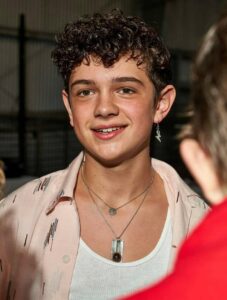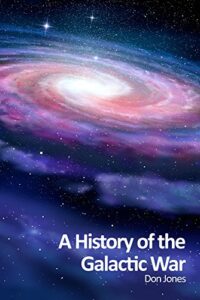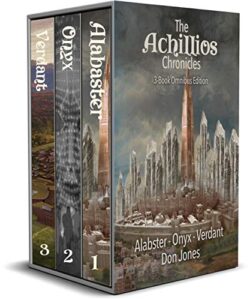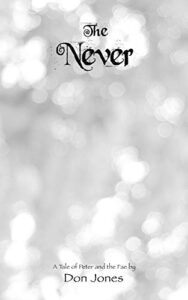Daniel Scratch: A Story of Witchkind received a 4+ star review, making it an IndieReader Approved title.
Following find an interview with author Don Jones.
What is the name of the book and when was it published?
Daniel Scratch: A Story of Witchkind; June 2020
What’s the book’s first line?
“Here you go, Master Daniel,” Abbygail said, sliding a plate of eggs and sausage onto the rickety table.
What’s the book about? Give us the “pitch”.
A young, isolated orphan of witchkind, Daniel Scratch is Tested and found to be the next Adherent of the Sixth Axis, one of the world’s most powerful magic forces. He is abandoned at the base of the Tower of Endings, where his education on the Axis begins. As he grows, he learns more about the greater society of witchkind that he’s never been a part of, and learns that not every problem can be solved with a simple Ending.
What inspired you to write the book? A particular person? An event?
Nearly the entire story played out in a dream—I lurched from bed the minute I came to and started furiously taking notes. I’ve always loved stories of fantasy that have some connection to real-world concerns and philosophies, and I think my subconscious assembled this for me along this lines.
What’s the main reason someone should really read this book?
My favorite fantasy stories toss you into the middle of an existing world and let you discover more and more about it as you read—and I think that’s what this story (and its sequels) does well. There’s no rush to get to the end—instead, you get to experience the world just as Daniel does, learning about the magic, the politics, the people, and some of the history. It’s intended as a really rich world, one that’s been around for centuries, and will continue for centuries more.
What’s the most distinctive thing about the main character? Who-real or fictional-would you say the character reminds you of?
I suppose there’s a little bit of Harry Potter in Daniel—neither of them fully realized the world that they belonged to, and they discovered it as they went. Daniel feels a little darker and maybe sadder to me, which is definitely something of a self-reflection. But what’s striking about Daniel is his quiet acceptance of what’s thrown at him: he stares at the world, nods slowly, and moves on with it.
If they made your book into a movie, who would you like to see play the main character(s)?
Definitely Noah Jupe, although we’d have to find a way to age him as the movie went. Daniel Scratch opens with Daniel just passing his 13th birthday, and ends when he’s just turning 18.
When did you first decide to become an author?
I’ve been a technology author since 2000, and I’ve always had fantasy and sci-fi stories roaming around in my head. Oddly, I also do a lot of career and motivational speaking, and I kept telling my audiences to just go do it, while a fear of criticism kept me from writing any of my stories down. Work and life finally conspired to give me some free time, and I decided that what I needed to do was put my money where my mouth was.
Is this the first book you’ve written?
I’ve written probably 40 or 50 technology books, and a half-dozen or so fiction books. A History of the Galactic War was my first, and I wrote it specifically to avoid dialogue. It’s a history textbook from a few hundred years on our future, looking back at the galactic war we have yet to experience. That let me get comfortable with plot and such, because character dialogue felt difficult to me. Alabaster was next, which was—oddly enough—another story about a young man finding his place in a tower of sorts. That became The Achillios Chronicles trilogy, which is now publishes, and let me work on long-form story arcs, character dialogue, and the like.
The Never: A Tale of Peter and the Fae was next, and it’s the novel I really had in my head for two decades. It’s a retelling of Peter Pan, with Peter as a relatively minor character. Instead, the story focuses on the fairies themselves, their exile from Under Hill, and their eventual discover of what became Neverland.
What do you do for work when you’re not writing?
I help run an online technology skills development company, Pluralsight. We help people all over the world unlock and grow their tech skills, and it’s an amazing company with a fantastic mission.
How much time do you generally spend on your writing?
I have a process that I developed for tech books that’s pretty efficient. If I can get a solid day of uninterrupted writing in, it’s worth about 8,000-10,000 words. So a book like Daniel Scratch might take a month to outline and block out, and then just a couple of weeks to write. I do a lot of writing in the evenings and when I’m on vacation—new places always make me feel more creative.
What’s the best and the hardest part of being an indie?
Just reaching readers. There’s so many amazing stories out there, but so few ways to discover them. It’s one reason I’ve found IndieReader and similar sites to be so valuable to me as a reader.
What’s a great piece of advice that you can share with fellow indie authors?
Get some solid beta-readers, and a really solid copyeditor! Between them all, they’re likely to pick up most of your mistakes, and those typos really do annoy readers.
Would you go traditional if a publisher came calling? If so, why?
I’d have the conversation. Publishers can do a lot to increase your reach: they’ve got marketing budgets! But the freedom of being able to work on your own, call your own shots, and produce exactly what’s in your head is pretty alluring.





